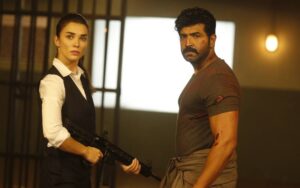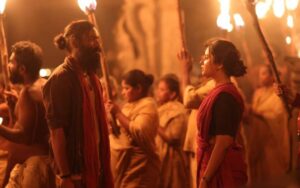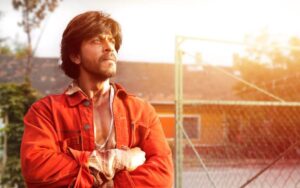A COIN Exclusive!!! My first play in school was a disaster: Seethakathi director Balaji Tharaneetharan

Cineobserver.in caught up with director Balaji Tharaneetharan for an exclusive interview on his upcoming Vijay Sethupathi-starrer Seethakathi, which hits screens on Thursday, December 20. In part 1 of this two-part interview, Balaji Tharaneetharan tells about the reason for naming this film Seethakathi, the reason for fashioning Vijay Sethupathi’s character on J Krishnamurthy, his school life and how friends and classmates decided he would end up being a director even then.Also, get to know, who Seethakathi was and why a famous saying now exists…
Director Balaji Tharaneetharan, who made a fantastic debut with his rib-tickling comedy film Naduvula Konjam Pakkatha Kaanom, is back with another masterpiece called Seethakathi.
The name Seethakathi is not new to Tamil audiences as it is the name of a philanthropist who lived in the 17th century. However, the director has already clarified that the film will be about theatre artistes and not about the philanthropist. That gives rise to the question as to why then he chose to name the film after the great man.
Smiling warmly, Balaji Tharaneetharan begins,”There is this famous saying in Tamil, ‘Seththum Koduthaan Seethakathi’. That saying has a connection with this story. That is why I have named it so. You will understand that connect once you watch the film. I don’t know why but that was the first title that came to my mind when I completed this script.”
The fact that he has named his film after a historical figure shows that Balaji Tharaneetharan has a deep interest in history.
“I like to read in Tamil and I like to ready story books,” he says.
Balaji says that the inspiration for Seethakathi came from a play he watched and the questions that arose in his mind after watching it. What were those questions that got him to write the script of Seethakathi?
“Five years ago, three months after Naduvula Konjam Pakkatha Kaanom released, I watched a normal contemporary play. I have never watched plays other than those in my school. So, when I watched this play, I turned nostalgic. That was because the play had actors whom we had seen in Doordarshan. I was seeing these actors after almost 20 years. They had aged but then they were acting with exactly the same amount of enthusiasm and zest they had before. They were very sincere in what they were doing. When I went backstage, the equipment that they had was very limited. Very few had turned up to watch the play. There is no way they could have had any income from staging the play. In fact, they would have had to spend more money on staging the play than their earnings from it. But despite all of these factors, they were doing it for the sake of their joy and satisfaction. But despite all this, there was a jubilant mood there.
“The jubilant and enthusiastic mood that I witnessed there was what stood in my mind. The more I thought about it, the more I felt like writing a script. That was how the script of Seethakathi evolved. I named it Seethakathi in my first draft itself,” says Balaji.
Vijay Sethupathi’s look in the film is fashioned after the renowned thinker J Krishanmurthy. Will his thoughts and thought processes also be showcased in the film?
Says Balaji,”I do not know if this thoughts or thought processes appear directly in my film. It may be there. That is because I have read many of his books. I like his appearance. Even when he was 90, he was clean shaven and neatly dressed, unlike a typical samiyar. The moment someone looks at him, they would feel the need to respect him. The character that Vijay Sethupathi plays in the film, Ayya, is in the same age group. People in that age group are very neatly dressed. I don’t shave or comb my hair. But if you take my dad, who is over 65, or my father-in-law, who is over 75 years old, they are neat, clean shaven and well groomed. Therefore, I thought he must appear that way.
“With regard to the thought process of JK, it might be there because I might have been sub-consciously affected by his thoughts and therefore, even without my knowledge, a character I have created might be reflecting those traits.”
Each of JK’s thoughts were deep and profound. Get Balaji to disclose one thought of the thinker that appealed to him the most and he says, “Meditation is not what you do for just 10 minutes. It is much more than that. When you do your day-to-day activities with awareness, that is meditation. Whatever it is you do, you need to do it with complete awareness about it. That is meditation. However, if you ask whether I have succeeded in implementing this thought in life, I will say no.”
Many would think that for someone to make a film on theatre and theatre artistes, the person directing the film would have had to have a long association with the medium.
Not necessarily, says Balaji, who gives out details of his theatre experience.
“To be honest, before writing this script, I had not watched many plays. However, the first prize that I won in school was for a play that I directed. I studied in Guru Nanak Matriculation school in Velachery. I wasn’t very active in sports because of an operation I had to undergo in my leg. Then, I couldn’t go for oratorical competitions or debates because of I have this stammering problem. I tried participating in an oratorical competition once and came back regretting my decision to participate in it. So, I wouldn’t participate in any cultural activity.
“It was under these circumstances that I staged my first play when I was in my tenth standard. It turned out to be a disaster. It was a play about how it would be if Tiruvalluvar returned to Tamil Nadu in this day and age. All of us who were staging that play goofed up together. Then, when I was in my Twelfth standard, I staged another play. We did not put too much effort into this one but this went onto become a phenomenal success. This play was about an elderly person, who was part of the freedom struggle, being invited to hoist the National flag on Independence Day. On Independence Day, when he makes his way to the school to hoist the flag, the events that he witnesses make him have a change of heart and he refuses to hoist the flag. That was the year, we were celebrating our 50th year of Independence. I wrote the script and directed it. I even acted in it. That play was a huge success. All the boys decided that I would become a director then itself. That play gave me a joy.
“After that, I haven’t staged any plays. But then, for the sake of making this film, I went and watched some plays, mainly to understand the mood there. If you observed, you would find that not many people would know where these plays are even being staged. The audience there will be from a particular segment – that is they would be over 50. There wouldn’t be many people. Yet, the mood over there will be vibrant and full of life. It was to understand this mood that I watched plays.”






